Fuad Muradov: Personal interests of some Azerbaijanis create obstacles to diaspora unity
- 30 December, 2024
- 06:42

The diaspora plays a special role in promoting Azerbaijan's tangible and intangible cultural heritage abroad, as well as in conveying its rightful voice to the world. The State Committee on Work with Diaspora is the body that regulates the activities of Azerbaijanis living abroad.
In his interview with Report, Committee Chairman Fuad Muradov discussed the current number of Azerbaijani diaspora organizations, the role of Coordination Councils in those organizations' activities, and the support mechanisms of the Azerbaijan Diaspora Support Fund for projects.
He also answered questions about cooperation with Azerbaijani embassies and missions abroad, factors contributing to the opening of Azerbaijani Houses, and critical opinions occasionally shared on social media platforms about the Committee and diaspora organizations.
- How many Azerbaijani diaspora organizations currently exist and in approximately how many countries do they operate?
- The formation of Azerbaijan's diaspora policy, the organization of the diaspora, and the establishment of a state body responsible for implementing policies in this field are associated with prominent statesman Heydar Aliyev. The National Leader met with our compatriots during each foreign visit, advising them to maintain close ties with Azerbaijan and with each other, to direct their potential toward their homeland, and to know their language and history well. Successfully continuing this path, President of Azerbaijan Ilham Aliyev has enriched the diaspora policy with new criteria, resulting in a qualitatively new stage in the activities of Azerbaijani communities abroad, especially in the organizational area.
Currently, Azerbaijan has more than 300 diaspora organizations in various countries. Our first diaspora organization is over 50 years old. Today, the organization of the diaspora is proceeding more rapidly following modern requirements. We are permanently active in approximately 70 countries, but our compatriots live in many more countries; they haven't organized to the same extent as others yet.
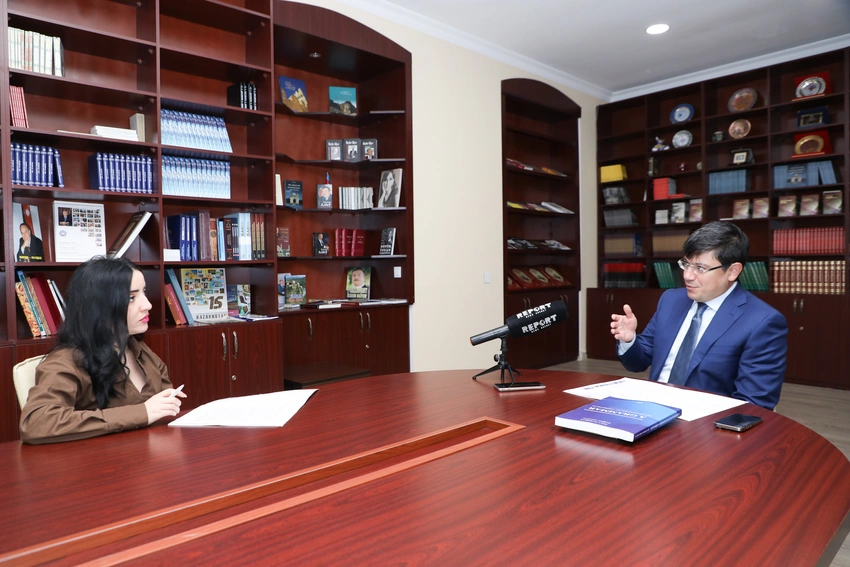
For example, we have newly formed communities in countries like Nigeria, Colombia, and Mexico. Several Azerbaijani families live in Iceland, and they have registered by establishing a diaspora organization. Our cultural and art representatives live in Trinidad and Tobago, and they have also proposed to create a diaspora organization.
In general, as a committee, we do not initiate the creation of any diaspora organization. Our position is simply to support the organization of Azerbaijanis living abroad and, at the same time, to coordinate existing communities. The Committee and the Azerbaijan Diaspora Support Fund (ADSF) operating under it provide material, moral, and institutional support to diaspora organizations in these particular areas.
- What is your opinion on proposals for managing these organizations from a single center? Because, as far as I know, there are already coordination councils to facilitate management and increase efficiency.
- Currently, there are 17 coordination councils uniting world Azerbaijanis, and these councils serve to increase the effectiveness of diaspora activities.
There is a roadmap covering 2018-2025 regarding diaspora organizations. When preparing this map, an action plan was drawn up for each country. During the research and analysis within the framework of this action plan, serious gaps in coordination between diaspora organizations were revealed. For instance, in some major cities, several diaspora organizations operate, and sometimes these organizations would hold events on the same topic separately in the same city, which consequently raised questions in the local community. In such events, the unity of the community and the participation of public political figures is desirable. The establishment of coordination councils was also important from this perspective.
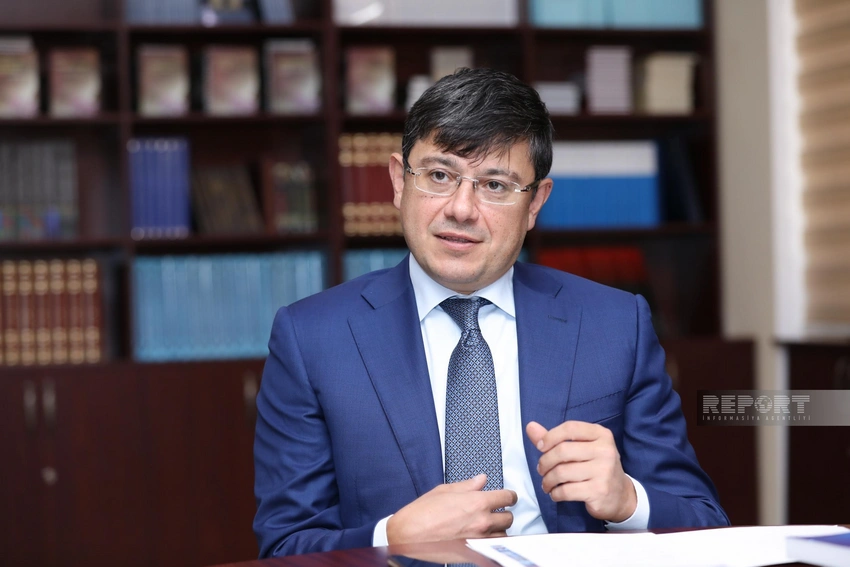
Before the councils were created, one of the problems was that organizations were implementing the same projects. Sometimes, one organization wanted to organize events in all directions by itself, which reduced the efficiency of the work. Therefore, we monitored the activities of organizations and learned which organization was more successful in which events, and as a result, we encouraged each organization to be more active in their successful areas.
True, it wasn't easy to operate as a coordination council in the beginning. Because some organization leaders viewed this as a problem for their independent activities. But later they observed that this type of activity actually increased the effectiveness of their work. Today, our organizations operating worldwide have united under a coordination council for their respective regions.
Currently, our goal is to register the existing coordination councils as observers in the parliaments of their respective countries. Our organizations can already participate as observers in the Council of Europe and European Parliament. Serious work is underway to boost their activities in the United Nations as well.
- What is the state of relations and joint activities between Azerbaijani diaspora organizations and embassies?
- This year alone, events have been organized together with more than 50 embassies and representative offices. Of course, the embassy knows the situation regarding Azerbaijan better, and we recommend diaspora organizations work in coordination with them. Almost all diaspora events are attended by either the ambassador or embassy staff. Our working group operates regularly together with the Ministry of Foreign Affairs.
- A while ago, you mentioned the Fund for Support to Azerbaijani Diaspora operating under the committee. How many projects did this fund provide financial support to in 2024, and what areas did these projects cover? In general, how frequently do Azerbaijanis living abroad apply to the committee regarding projects?
- The Fund for Support to Azerbaijani Diaspora has several areas of activity. One of them is providing grant projects to individual community members. The fund supports approximately 50-80 projects annually, and these projects are multidirectional. These include various events implemented in cooperation with other funds, book publishing, film production, presentation of our national music in the largest concert halls of foreign countries, promotion of our culture, and several other directional projects.
The fund also provides humanitarian aid during emergencies. For example, last year, large aid was sent three times to people affected by the earthquake in Türkiye. FSAD sent school supplies and other essential items to our compatriots affected by the earthquake and also paid for the education and medical expenses of our compatriots living in various countries.
The fund has spent a total of 1 million manats ($580,000) in the mentioned directions. When discussing the fund's work, we should also mention the transportation of deceased compatriots' bodies from abroad to the country. In 2024, FSAD supported the transportation of 21 bodies to Azerbaijan. Here too, of course, actions are taken within the established rules.
Overall, the committee and fund have held 800 different events this year, and each of these events is a separate project.
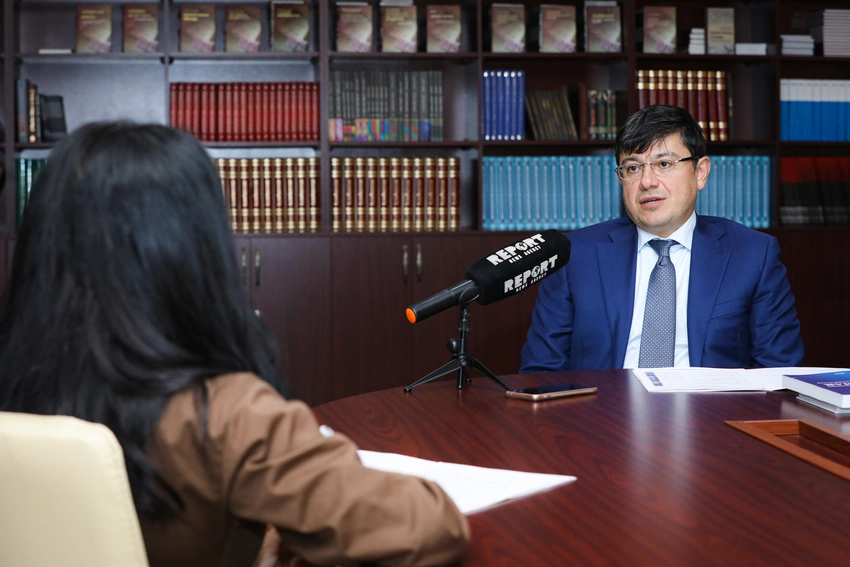
- Azerbaijanis living abroad sometimes express dissatisfaction with the activities of diaspora organizations in their area. What could be the reason for diaspora organizations not being proactive enough? In general, how are complaints addressed? What steps are being taken to ensure the effective operation of organizations that cause dissatisfaction? In this regard, what can you say about the situation in the Baltic countries?
- The activities of diaspora organizations are influenced by the number of Azerbaijanis living there, the community's desire, and many other factors. Therefore, we choose a city as a center taking these factors into account. For example, in Tallinn, Estonia, there is an Azerbaijan House, which includes a weekend Azerbaijani school. However, this doesn't mean we don't take the initiative to create such conditions in other Baltic countries. Simply put, if an Azerbaijan House is opened, it must have teachers who teach the Azerbaijani language.
By the way, members of the Coordination Council operate in both Lithuania and Latvia. Our compatriot, who has been a coordinator in Latvia for a long time, is also a member of parliament. Our coordinator in Lithuania is a former student who studied there and sets a good example in implementing interesting events every year.
Naturally, we are fully informed about the activities of Azerbaijani communities abroad and diaspora organizations, and the complaints received by the committee are so minimal that they don't even constitute 0.5 percent. It can be confidently said that a friendly, business-like environment has formed within and between communities. The numerous cultural and social events that have been implemented have made this environment even healthier.
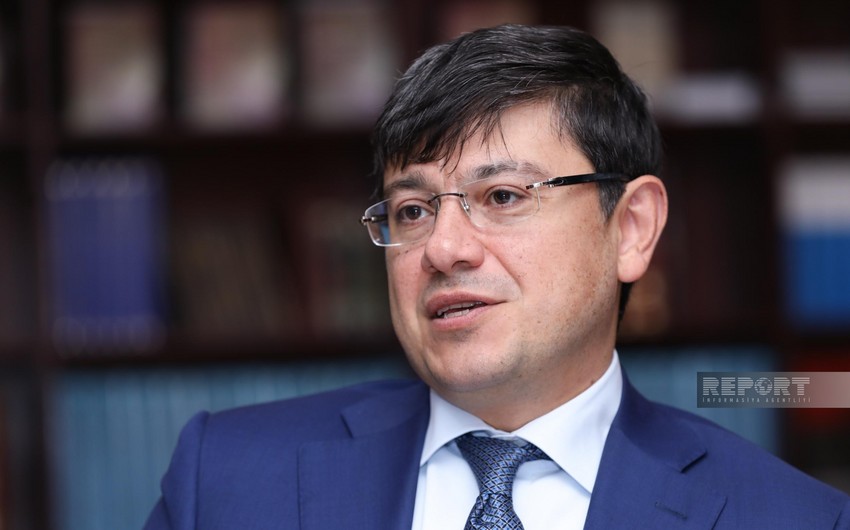
- In August, an Azerbaijan House was opened in the US, bringing the total number of Azerbaijan Houses opened in 18 foreign countries to 29. In which other countries are Azerbaijan Houses planned to be opened? In general, what is done to promote Azerbaijani culture and cultural heritage?
- Part of our roadmap is specifically related to the promotion of art, language, cultural heritage, and other areas that increase the quality indicators of community activities. According to the roadmap, Azerbaijan Houses began opening in 2018. Each Azerbaijan House operates a weekend Azerbaijani school. Weekend schools had been opened in previous years as well. Azerbaijan Houses expanded this work further. Azerbaijan Houses are cultural centers open to all Azerbaijanis and foreigners who love Azerbaijan, and they play a significant role in promoting our country worldwide.
Azerbaijan Houses host cultural events, organize competitions, and commemorate our holidays and days of mourning, etc. There is even an interest club operating in Azerbaijan Houses. All these activities have a very positive impact on the unity of our compatriots.
The existence of Azerbaijan Houses creates a sense of responsibility among diaspora representatives, as this is a place that promotes Azerbaijan. We initially started this as a pilot project. The committee's resources are limited, and diaspora organizations also need to dedicate a certain time to implement the process. Therefore, opening an Azerbaijan House takes considerable time. First of all, the activities to be carried out there are determined. As for selecting leaders for these Houses, we simply provide recommendations considering the criteria and frameworks. The community itself chooses the managing person. What's crucial for us is that the House functions.
Currently, there are many requests regarding the opening of Azerbaijani houses. For example, openings of Azerbaijani houses are planned in Iraq and Lebanon, and negotiations are ongoing in this direction. However, this doesn't mean they will open in two months. The opening of Azerbaijani houses is also planned in Great Britain and Denmark. There are also requests for opening Azerbaijani houses in Stuttgart, Germany, and in several states of the US. Additionally, the expansion of the Azerbaijani house in South Korea is planned due to the increase in the Azerbaijani community.
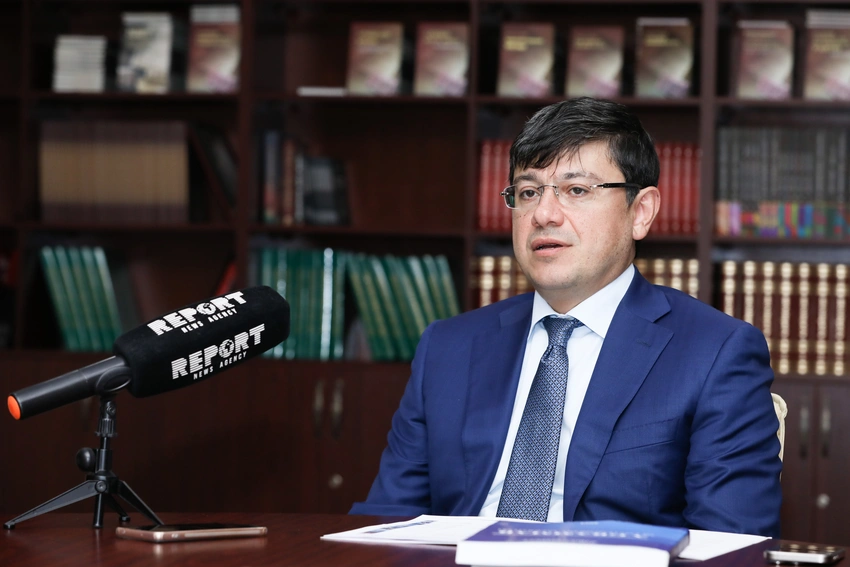
The concept of newly opened Azerbaijani houses is proposed by the community itself. For example, regular legal assistance is provided in Azerbaijani houses in Poland. If the embassy is located in the capital and the Azerbaijani House is in another city, the consul visits the Azerbaijani House to conduct consular consultations there.
We are taking responsibility for some financial and technical issues related to Azerbaijani houses. However, these houses cannot be permanently funded by the Azerbaijani state. After a certain period, if the community truly wants to continue the operation of the Azerbaijani house, community members must also provide support. Therefore, all newly opened Azerbaijani houses are given a certain period, after which financial assistance is reviewed. During that period, they must implement their operational mechanisms. This means that opening an Azerbaijani house doesn't guarantee it won't be closed. The future operation and development of Azerbaijani houses can always be subject to discussion.
Currently, the operation of Azerbaijani houses in Georgia is particularly important for us. Today, our largest Azerbaijani house is in Marneuli. There, 21 different subjects are taught.
- It was announced that an Azerbaijani language book for English speakers living abroad would be published in September. How is the teaching of this book ensured? In general, at what level is our language taught to prevent children of Azerbaijanis living abroad from forgetting their mother tongue? How many Azerbaijani schools exist abroad?
- Since 2018, studying the problems has allowed us to determine the directions of activity. Among these problems was the issue of not teaching the Azerbaijani language properly to the new generation. There were both subjective and objective reasons for this. We tried to solve this problem, and with the initiative of Leyla Aliyeva, Vice President of the Heydar Aliyev Foundation, an Azerbaijani language textbook was prepared and published for children abroad. This book was presented to all Azerbaijani houses and weekend schools. We have also placed the book on our website in electronic format so that anyone who wants can use it easily.
After this, we regularly began teaching the Azerbaijani language through various electronic platforms. However, due to time differences between countries, online classes are not yet very effective. However, the teaching of the Azerbaijani language in weekend schools is fully effective.
The book "A grammar of contemporary Azerbaijani" authored by linguist-scholar Sabina Aliyeva and Jala Garibova, Vice-Rector for International Relations at Azerbaijan University of Languages, published with the committee's support, is a comprehensive textbook for anyone who wants to learn the Azerbaijani language, including foreigners.
Today, there are more than 100 weekend schools abroad and Karabakh weekend Azerbaijani schools established on the initiative of First Vice-President Mehriban Aliyeva. These schools are crucial for teaching the Azerbaijani language. We have also been working on a large electronic platform for almost a year. Through this platform, it is planned to teach the Azerbaijani language to Azerbaijanis living abroad using various methods. Additionally, professional development courses will be implemented for teachers working in weekend schools.
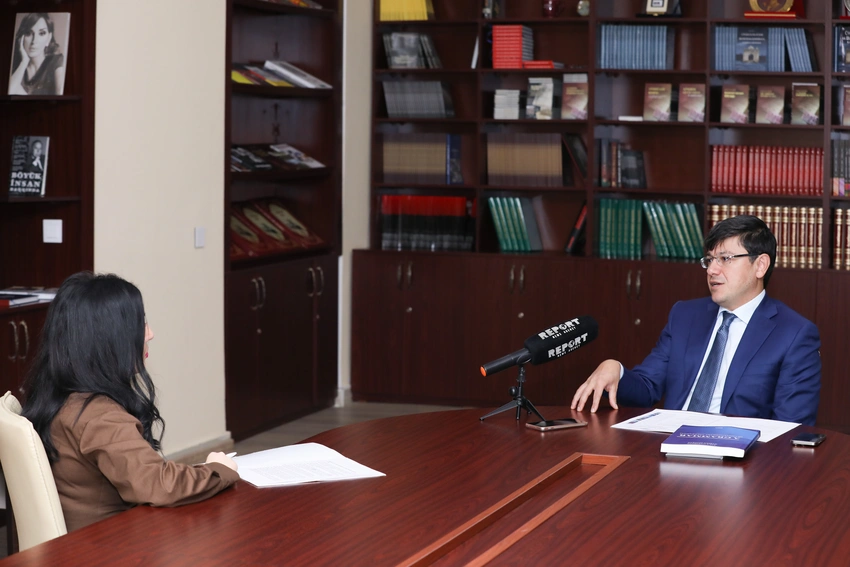
- What are the next stage of the committee's diaspora policy and new perspectives?
- One of the new directions is further strengthening diaspora organizations from a socio-political perspective. For three years, we have been supporting specialized forums, and these forums yield significant results. For example, more than two thousand doctors of Azerbaijani origin work in Germany. They have held three forums which resulted in forming a union and creating their own management boards. This year, several major media outlets in Germany published extensive articles about these forums.
The committee has also organized forums for Azerbaijani scientists, engineers, and students abroad. Similar work is being done with Azerbaijani cultural and art figures abroad. Through this way, they can make greater contributions to public-cultural diplomacy. It's impossible to imagine a greater force than culture for promoting the country. In the coming years, it is planned to organize specialized forums consistently and systematically, with an even broader scope.
Speaking of prospects, I must mention the Brotherly Schools project. Within this project, together with the Fund for Support to Azerbaijani Diaspora and Zafar Martyrs' Families Support Public Union, we organize visits of martyrs' and veterans' school-age children to brotherly schools for certain periods. Such a visit has been organized to Switzerland, and the next one will be to Moldova. Both the Brotherly Karabakh Schools and the Diaspora Youth Summer Camps projects implemented with the Heydar Aliyev Foundation, as well as other long-term and proven projects I haven't mentioned, have become traditional and are accompanied by successful results. We intend to ensure the continuity of these projects in the coming years.
In addition, we place special importance on book publishing. In recent years, support has been provided for the publication of more than 160 books, and the vast majority of these books have been published abroad. Presentations of several books have also been organized in foreign countries.
As I mentioned earlier, increasing the number of Azerbaijani houses and weekend schools based on diaspora proposals is also included in the action plan for the coming years. In general, new mechanisms are being created for networking of the diaspora, closer unity through new platforms, more intensive relations with the homeland, and successful integration into the societies where they live.
- What mechanisms are being implemented to strengthen the Azerbaijani diaspora against the active Armenian diaspora in countries like the US and France, which are not interested in ensuring stability in the region?
- The Armenian diaspora plays a major role in anti-Azerbaijan actions abroad. However, there are certain political circles that deliberately support the Armenian diaspora. We can clearly see this in France. The disrespect shown to the statue of Khurshidbanu Natavan alone demonstrates that this is not just the approach of the Armenian diaspora, but also of French politicians who are against Azerbaijan.
Every year, our diaspora organizations hold major events to convey our rightful voice to the international community. For example, our compatriots held consecutive protests for several days to protect Natavan's statue. Additionally, rallies were held in Paris both for justice for Khojaly and regarding France's policy against Azerbaijan. So our diaspora is very alert and active on such issues.
Armenia has the Office of the High Commissioner for Diaspora Affairs. However, the Armenian diaspora boycotts this organization and prevents its representatives from visiting most countries. In our case, the situation is completely different. In 2024 alone, during foreign visits, the committee leadership and staff held more than 300 meetings with Azerbaijanis living abroad and more than 200 meetings with officials. More than 5,000 Azerbaijanis participated in meetings held with our compatriots.
This approach by the Armenian diaspora demonstrates that they don't want peace, don't consider Armenia's interests, and act based on their own interests. Therefore, most diaspora leaders are banned from entering Armenia. Armenian diaspora organizations' activities are based on destructiveness and these organizations are mainly built on corruption.
I think that in the initial stage, we should strengthen and develop the activities of diaspora organizations and support them as a society.
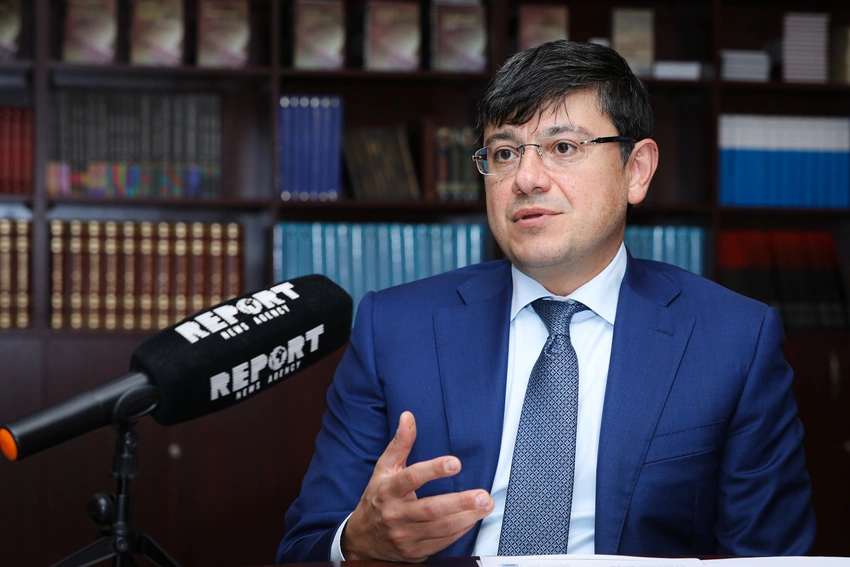
- Sometimes we encounter critical posts on social media platforms about diaspora activists expressing their views only in Azerbaijani language during protests. You would agree that the easiest way to convey our values to the other side is to speak in the language of the community we are in. In other words, they need to understand what the activists want and what they are defending. In this context, what is being done and what needs to be done to promote more effective and professional activities of diaspora members?
- Our goal should be the unification of the Azerbaijani diaspora, and we are successfully moving forward in this regard. However, unfortunately, we sometimes observe that our compatriots create obstacles to the unification of the diaspora. This is mainly related to their personal interests. They try to present their personal matters as the position of the diaspora.
Since 2018, speeches at mass actions have not been made solely in Azerbaijani. For example, I can say that the majority of our compatriots in the Netherlands know Dutch very well and can effectively convey Azerbaijan's truths to the world community using the language of their host country during actions and mass events they participate in. Similar examples can be given from other countries, and we can talk about the effective activities of the diaspora.
In general, information on actions organized by the diaspora in foreign countries has been provided in all official UN languages to date. These facts have been widely covered in local and foreign media, as well as on YouTube channels.
The Azerbaijani diaspora has strong potential, and this potential is being used effectively. By the way, I should mention that Pan-European Karabakh rallies were held in Brussels in 2019 and in Berlin in 2020, an All-American Khojaly rally in Washington in 2022, and a Pan-European Karabakh rally in Vienna in 2023. An All-American Khojaly rally was organized in Washington to commemorate the 30th anniversary of the Khojaly genocide. Thousands of our compatriots, dozens of foreign journalists, and historians participated in these actions.
In general, we strive to ensure that no one is left out of diaspora activities and that members of Azerbaijani communities abroad work together more effectively. We have opened the door for everyone and say that this is the Committee's approach. There were some organizations that had remained somewhat aside. We invited them and saw that some were not willing to work. Instead of doing their work, they tried to set conditions and mixed personal interests into the work.
I should also add that in the early years when we held events, the Armenian diaspora tried to prevent them. Today, such things don't exist. Because our diaspora has truly become stronger.
- What connections does the Azerbaijani diaspora have with other diasporas? How are relations with the Jewish diaspora?
- We not only have connections with the diasporas of our Turkic states but also joint projects. Every year, we hold joint forums with the diasporas of Turkic states. We've had meetings in New York, Berlin, and Baku. We have a joint action plan with the diaspora organizations of these states, and we have several major events every year.
At the same time, we have connections with large Jewish communities in the US, Australia, and Germany. We have strengthened our relations with diasporas there through Jews who have left Azerbaijan. In the US, we have carried out several events related to the Khojaly genocide together with major Jewish organizations.
We have relations with diasporas of other countries and maintain the intensity of these relations. We explore experiences from Italian, Irish, and Polish diasporas. Representatives of friendly diasporas in those countries are invited to almost all events. The diasporas we cooperate with also positively evaluate the activities of Azerbaijani communities, including their unity, relations with other diasporas, and solidarity with our state.
By the way, I congratulate all our compatriots on the Solidarity Day of World Azerbaijanis and wish them robust health and success in their activities. We are stronger together!
